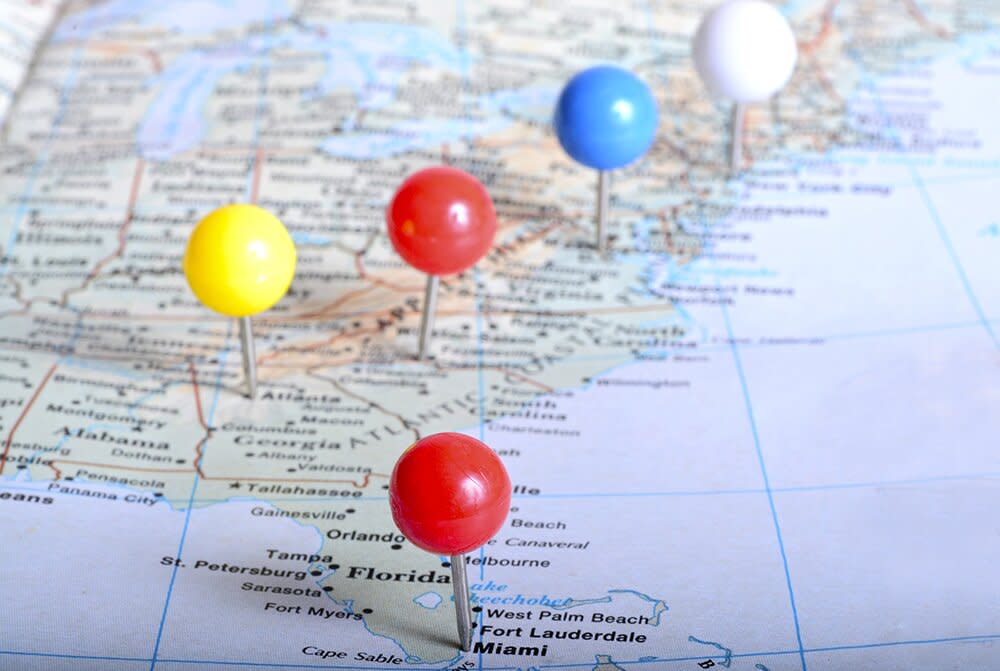What's the Likelihood of a Zika Outbreak in Your City?

Shutterstock
We knew it was possible, and now new research published in the journal PLOS Currents: Outbreaks points to the reality that Zika is coming to the United States as summer weather becomes the perfect breeding ground for this terrifying mosquito-borne illness.
Mosquito and disease experts at the National Center for Atmospheric Research (NCAR) say as temperatures increase, so does the likelihood that the Aedes aegypti mosquito will become more abundant in the southern and eastern parts of this country.
But the rest of the U.S. is not immune from an outbreak!
Researchers used computer simulations based on travel patterns from countries and territories with current outbreaks to make their predictions. We could see mosquito populations that carry Zika as far north as my city of residence, New York City, across the southern tier of the U.S., and even as far west as Phoenix and Los Angeles.
So basically the entire country.
Southern Florida and Texas will be the most vulnerable, even during winter and spring months; meanwhile, it remains too cold in the rest of the country for mosquitoes to breed during those times. It's worth mentioning long-term forecasters are predicting a 40 to 45 percent chance of warmer-than-average temperatures over most of the continental United States this summer, however.
The research team ran two computer models to mimic the impact of potential meteorological conditions on a mosquito's entire life cycle in 50 cities, which were selected because they were in or near the known range of the species. Here is what they predict is possible:
By springtime, mosquitoes may become more abundant in the Southeast and in some cities in Arizona.
Come June, almost all 50 cities they looked at may experience low-to-moderate abundance, and most eastern cities' climates are favorable for moderate-to-high abundance.
The dead heat of the summer, i.e. July, August, and September, has the potential for the most abundance of Zika-carrying mosquitoes.
Researchers also looked at travel patterns between countries experiencing outbreaks of Zika and the U.S cities. Specifically, the team estimated the number of passengers arriving on direct flights from airports in the 22 Latin American countries and territories listed on the Centers for Disease Control and Prevention's travel advisory. Cities with the most potential for an outbreak based on travel are Miami, Houston, and Orlando, home of my beloved Disney World.
Not surprisingly, researchers confirmed people living in poverty across the U.S. are also at the highest risk for infection as they are less likely to have air conditioning, and more likely to have open windows without screens that allow mosquitoes to get in.
Densely populated urban areas were also called out as being most vulnerable to an outbreak.
Sarah Ruth, program director in the National Science Foundation's Division of Atmospheric and Geospace Sciences, explains the significance of this new research, saying, "By integrating information on weather, travel patterns, mosquito biology, and human behavior, the project team has improved our ability to forecast, deal with, and possibly even prevent future outbreaks of Zika and other serious diseases."
That experts are proactively addressing this massively scary health crisis is comforting. As is NCAR scientist Andrew Monaghan's analysis that Americans are less likely to experience a Zika outbreak like we've seen in Brazil and other Latin American and Caribbean countries, given most people live in air-conditioned, sealed homes.
Want parenting news? Sign up for our Parents Daily newsletter
According to the press release, in general the optimal conditions for mosquitoes to breed are in warm and stable temperatures, or water-filled containers, where their eggs hatch. What I found interesting was how the virus actually spreads: First, a mosquito bites an infected person, then has to live long enough for the virus to travel from the mosquito's mid-gut to its salivary glands; that process takes about a week. Once in the saliva, the virus can be transmitted if the mosquito bites another person.
Mosquito elimination efforts may help to curb the spread of the virus according to researchers. It's worth mentioning the potential of a related species of mosquito that is more tolerant of cold temperatures, Aedes albopictus, adapting to carry the virus. This would mean even more U.S. cities could see outbreaks.
All in all, pretty scary. But better to know and be prepared.
Melissa Willets is a writer/blogger and a mom. Follow her on Twitter (@Spitupnsuburbs), where she chronicles her love of exercising and drinking coffee, but never simultaneously.

